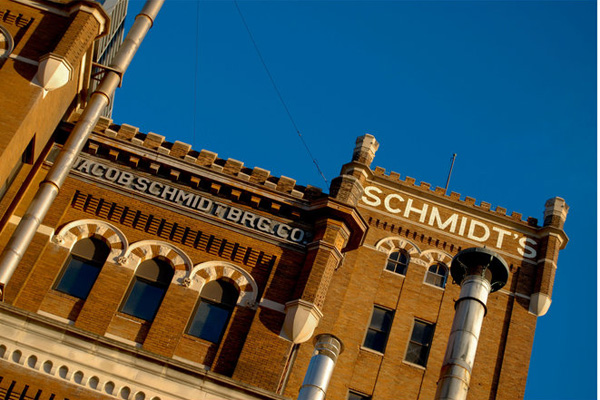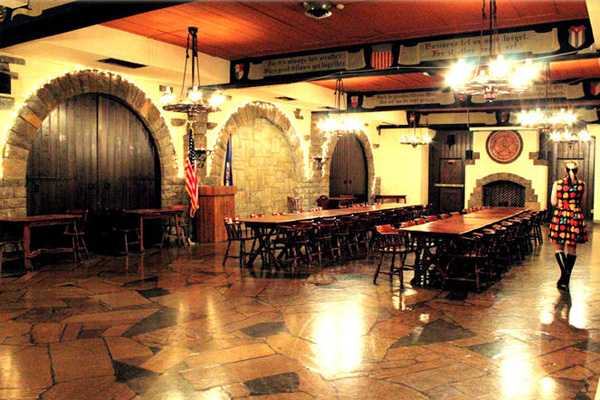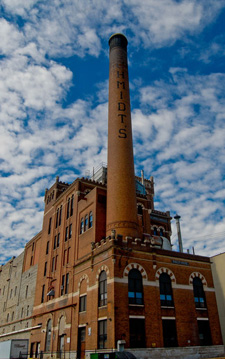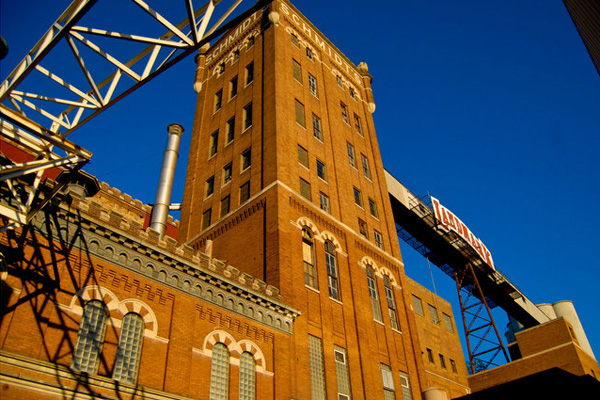
Sometimes, it’s the room that makes the drink all the more pleasing. Soon, Twin Cities residents may again be privy to the warm vibes of the 75-year-old rathskeller in the depths of the landmark Schmidt Brewery site (at 882 7th St W in St. Paul). A potential re-open of the space follows the recent momentum created by property owners, who renewed vending access to the site’s ancient water resources last year.
After producing beer for the better part of 13 decades, the Schmidt Brewery complex hasn’t provided the West Seventh Street community with much of a buzz in the New Millennium. That may be about to change. In recent weeks, the site’s owners have signed multiple purchases agreements for redevelopment on the property. One agreement is with Plymouth-based property management and development firm, Dominium; the other is with the West 7th / Fort Road Federation, a community advocacy group.
“We’re selling the front office and the majority of the land on West Seventh frontage to the West 7th / Fort Road Federation and I believe they’ll be doing some retail. And they’ve got the backing of the City of St. Paul, so I think there’s a strong chance that’s going to happen and that’s scheduled to close next April,” said Dave Kreitzer, who manages the property for Minnetonka-based owners BHGDN.

Among the goals of West 7th / Fort Road may be a re-opening of the rathskeller space coupled with the new retail offerings along West Seventh.
“And Dominium has been interested in this property for many years,” Kreitzer continued. “We’ve entered into an agreement to sell the castle building and the bottle house to Dominium and we expect them to close in the next year or so.”
Interest in the St. Paul landmark has been ongoing since Gopher State Ethanol concluded a two-year four-year use of a portion of the property in 2004. During that time, Gopher was the nation’s only urban ethanol plant but ultimately departed amidst legal battles and neighborhood unrest over noise and odor pollution in the community. The complex hasn’t produced a bottle of beer since 2002, when Minnesota Brewing Company ended its decade run of brewing products such as Pig’s Eye, Landmark, and Grain Belt on a small-scale basis.

This isn’t Kreizter’s first rodeo with finding a new tenant, although the new purchase agreements represent his strongest hopes to date for an eventual closing sale. Noting that he’s “been involved in three previous agreements in the past six-plus years,” the site manager adds: “This is the first time I’ve got a lot of confidence that this thing is gonna happen.”
Speaking toward Dominium’s plans for the project, Senior Development Associate Owen Metz said of the developer’s aims:
“To convert the brew house and the bottle house to affordable live-work artist housing. It will be a lot of lofts; the bigger spaces in the bottling house sets up well for that. Then the brew house, too, for some cooler, bigger units that will have some lofts and mezzanines in them that give it a different feel because there’s some really high ceilings in a lot of those places.”
With an initial plan for 220 units, Metz said the Schmidt project would serve among the largest in Dominium’s portfolio. Citing the company’s work on such projects as the Carleton Artist Lofts on University Ave. in St. Paul, Metz further spoke to the myriad details involved in the Schmidt deal.
“The agreement calls for a 12-month holding period with some extensions, just with the nature of an affordable housing deal with low-income housing tax credits, tax exempt bonds and TIF [Tax Increment Financing],” Metz explained. “And then you throw in the complexity of getting the National Park Service and the Minnesota Historical Society being OK with the historic plan or renovation for the buildings — there’s just a lot of balls in the air that need to be caught, put into place and get the deal worked out.”
Also speaking toward the site’s historical value, Kreizter referenced the draw of the rathskeller, then added:
“Part of the purchase agreement is to begin the historical designation process at the federal level, which I’m sure is very exciting to the neighbors and the historical community that this is finally moving forward in that direction.”

The Schmidt property is deeply-rooted in this one-time industrial region of St. Paul. The site began brewing beer back in the mid-1850’s, as the Stahlmann Cave Brewery. Near the turn of the century, Bavarian-born Jacob Schmidt — who had long worked for both Theodore Hamm in St. Paul and August Schell in New Ulm — returned to the capitol city and opened the North Star Brewery. Shortly after Schmidt’s retirement in 1899, when he turned control of the business over to his daughter and son-in-law, the brewery burned down and the business relocated to take over the current Schmidt site with an eponymous moniker. After managing to stay solvent during Prohibition with non-alcoholic beverages, the site prospered in family hands until 1955, when the company was sold to Detroit-based Pfeiffer Brewing Co., which continued to produce the Schmidt product. That ownership lasted 17 years, when the site was sold to G. Heilemann Brewing out of La Crosse, WI in 1972. Minnesota Brewing began their production twenty years later.
Last year, the site began selling water (at 50 cents a gallon) from the first time since beer brewing ceased seven years prior. The water derives from the Mount Simon-Hinckley aquifer, and ascends to vending machines on West Seventh via a well first dug in the Stahlmann days. The vast source is dated at approximately 35,000 years old. In the late 1980’s, the state passed the Ground Water Act, which allows for only a few grandfathered municipalities to still tap into the well’s massive resources.
“I was approached by the community and they were interested in figuring out, ‘How can we open the water?’” Kreitzer says of ownership’s decision to again offer a popular product that once created lines down West Seventh. “We were able to partner with the West 7th / Fort Road Federation and re-open the well water. So management installed a new pump, and it’s a smaller pump that goes down 300 feet — something like that — it doesn’t have to go all the way down 1,100-feet because static pressure pushes the water up.”
Arriving to the surface via “Well No. 6” dug in 1980, Kreizter details just how unique (and clean) the water is:
“There are two different ways you can sell water: ‘transient’ and ‘non-transient.’ At your house, you’re non-transient…. Bottled water, beer, and pop: That’s all non-transient because you can drink the same stuff all the time — it has to be chlorinated and go through all sorts of filtration,” the site manager concluded, adding that water will continue to be sold during the ongoing contract process. “Because of how we sell water here people have to bring their own jugs; they have to go through the effort to drink this same water everyday, so the Department of Health says this is a transient system. People aren’t likely to just drink this water all the time. So you don’t have to chlorinate it and do all that other stuff. We’re the only place in the metro area that I’m aware of that pulls out of the Mount-Simon aquifer and is able to sell the water without adding the chlorine or any other chemicals.”

The residents of the West 7th neighborhood put up with the toxins and stench of Gopher State Ethanol for four full years, not two.
Just Sayin’ — Good catch. That was a typo (now corrected) on my part. Gopher was indeed there for four years, from 2000-2004.
Fun article – would love to see something fun and unique in that space. Sounds like their is some good, rich history that could be re-tapped (no pun intended) for the public…
I for one would love to see the Rathskeller used for dining and drinking, Deutsch-Stil. True, we have the Glock, which is a great place. But it would be nice to have a place with long tables filled with people awash in Gemütlichkeit, beer and Spätzle. And Polkas. I used to have a crazy vision of a Buca-type German restaurant in that space, with food served family style, and the atmosphere as over-the-top Teutonic as Buca is guido-riffic.
Picture a happy room with singing people, gorging on Weißwurst mit Brödchen, and bosomy St Pauli girls heaving great steins of (good) beer around… Oh, my.
At least, until MADD finds out about it and puts the kibosh on it!
The history of this site is really fascinating. Thanks so much for an interesting article!!
Hi! I purchase Schmidt Water. Why does it have a garlic like odor to it all the time? It tastes okay but I wonder about the odor. A few times it had a petroleum like odor to it too. I am one who tries to drink spring water 100% of the time. I also drink Buhl Water from Buhl Minnesota available in grocery stores and try to avoid reverse osmosis water. If you can’t answer my question do you have any leads as to who I could contact?
Thanks!
Mike